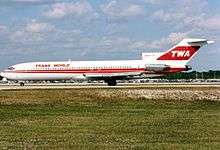TWA Flight 840 bombing
 A Boeing 727-231 of TWA, similar to the aircraft involved in the incident | |
| Bombing | |
|---|---|
| Date | April 2, 1986 |
| Summary | Bombing |
| Site | Argos, Greece |
| Aircraft type | Boeing 727-231 |
| Operator | Trans World Airlines |
| Registration | N54340[1] |
| Flight origin | Los Angeles International Airport |
| 1st stopover | John F. Kennedy International Airport |
| 2nd stopover | Leonardo da Vinci Int'l Airport |
| 3rd stopover | Athens (Ellinikon) Int'l Airport |
| Destination | Cairo International Airport |
| Passengers | 115[2] |
| Crew | 7[2] |
| Fatalities | 4 |
| Injuries | 7[3] |
| Survivors | 118[2] |
Trans World Airlines Flight 840 was a regularly scheduled flight from Los Angeles to Cairo via New York City, Rome, and Athens on April 2, 1986. About 20 minutes before landing in Athens, a bomb was detonated on the aircraft while it was over Argos, Greece, blasting a hole in the plane's starboard side. Four passengers were killed after being sucked out, while another 7 were injured by flying shrapnel and debris. The aircraft then made a successful emergency landing with no further loss of life.[4]
Aircraft
The Boeing 727-231 involved in the incident was delivered to TWA in 1974, with the registration N54340.[5][6] It was fitted with 3 P&W WJT8D-5 Turbojet engines.[5]
Flight
The flight originated in Los Angeles on a Boeing 747 and transferred to a Boeing 727 in Rome for the remainder of the flight.[7] After taking off from Athens, Greece, the flight remained uneventful until around 20 minutes before landing, when the aircraft was at around 11,000 ft.[8] A bomb hidden underneath seat 10F during an earlier leg of the flight detonated, blowing a hole in the fuselage.[7]
Four American passengers, including an eight-month-old infant, were ejected through the hole to their deaths below. The victims were identified as a Colombian-American man; and a woman, her daughter, and her infant granddaughter.[7] Seven others on the aircraft were injured by shrapnel as the cabin suffered a rapid decompression. However, as the aircraft was in the middle of its approach to Athens, the explosion wasn't as catastrophic as it would have been at a higher altitude.[7] The remaining 110 passengers survived the incident as pilot Richard "Pete" Petersen made an emergency landing.[7]
Aftermath
The bodies of three of the four victims were later recovered from an unused Greek Air Force landing strip near Argos; the fourth was found in the sea.[7]
A group calling itself the Arab Revolutionary Cells claimed responsibility, saying it was committed in retaliation for American imperialism and clashes with Libya in the Gulf of Sidra the week before.[9]
Investigation
Investigators concluded that the bomb contained one pound of plastic explosive. As the bomb was placed on by the floor of the cabin, the explosion tore a hole downward, where the fuselage absorbed the most damage. It is suspected it had been placed under the seat cushion on a previous journey by a Lebanese woman (later arrested, never convicted) who worked for the Abu Nidal Organisation, which was dedicated to the destruction of the state of Israel.[10] They had previously hijacked and bombed several other aircraft, as well as committing various terrorist attacks in parts of the Middle East.[11]
See also
- Daallo Airlines Flight 159 - Similar incident in which a suicide bomber detonated a bomb on board, whereafter the plane managed to make a successful emergency landing
- Philippine Airlines Flight 434 - A 747 where a bomb went off, followed by a successful emergency landing
- Pan Am Flight 830 - Another 747 that landed safely after a bomb exploded
- United Airlines Flight 811 - Experienced an explosion after the cargo door opened in mid-flight, causing several passengers to be sucked out of the aircraft
- List of accidents and incidents involving commercial aircraft
References
- ↑ "FAA Registry (N54340)". Federal Aviation Administration.
- 1 2 3 William E. Smith; John Borrell; Mirka Gondicas (1986-04-14). "Terrorism Explosion on Flight 840". Time. Retrieved 1 September 2010.
- ↑ BBC (1986-04-02). "On This Day - 1986: Bomb tears hole in airliner over Greece". BBC News. Retrieved 1 September 2010.
- ↑ "TWA Pilot's Wife Says Her Husband is a Hero With PM-Plane-Bomb Bjt". AP News. Associated Press. 3 April 1986.
- 1 2 "Aircraft N54340 Data". Retrieved 1 April 2018.
- ↑ "FAA Registry". Retrieved 2 April 2018.
- 1 2 3 4 5 6 "4 killed as bomb rips T.W.A plane on way to Athens". The New York Times. Archived from the original on 2 April 2018. Retrieved 2 April 2018.
- ↑ Bomb Blast On Airliner Kills 4 Jet Lands Safely In Greece
- ↑ "Abu Nidal Organization (ANO)". mackenzieinstitute.com. 11 December 2015. Retrieved 2 April 2018.
- ↑ "Abu Nidal Organization (ANO) attacked Airports & Airlines target (Apr. 2, 1986, Italy)". MIPT Terrorism Knowledge Base. April 3, 2001. Archived from the original on September 30, 2007. Retrieved August 26, 2012.
- "Hell on Athens Flight 840" by Nancy Locke Hauser (now Capers), July 1986, Cosmopolitan Magazine, https://ucsd.academia.edu/NancyCapers